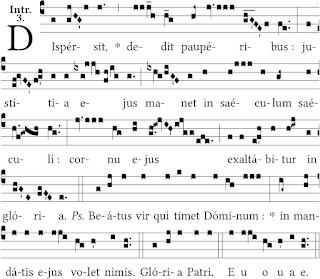As was also the case yesterday, so am going to presume that today will be another of 90 degrees. It is of little use and often demoralising to check in with the weather mages but I do it; Thursday will be cooler, according to the one site. I reckon it is helpful to have a limit placed on the late afternoons' discomfort.
Benedícite, sol et luna, Dómino: * benedícite, stellæ cæli, Dómino. Benedícite, omnis imber et ros, Dómino: * benedícite, omnes spíritus Dei, Dómino. Benedícite, ignis et æstus, Dómino: * benedícite, frigus et æstus, Dómino. Benedícite, rores et pruína, Dómino: * benedícite, gelu et frigus, Dómino. Benedícite, glácies et nives, Dómino: * benedícite, noctes et dies, Dómino. Benedícite, lux et ténebræ, Dómino: * benedícite, fúlgura et nubes, Dómino. Benedícat terra Dóminum: * laudet et superexáltet eum in sǽcula.
Perhaps people in the Schola Sainte-Cécile at Saint-E. have returned from summer holidays? in any case, the Schola is singing today's Mass of Saint Joachim, Dispersit dedit pauperibus (the livret is here, and the essay at Liturgia is here). Perhaps because yesterday was or today is the second anniversary of the death of one of the singers of the Schola, Nicholas Krasno, requiescat in pace; perhaps simply because it is Saint Joachim's feast. Tomorrow will tell if the sung Masses are continuing, or if we will return for a while to the missa lecta.
The Alleluia, O Jóachim, sanctæ conjux Annæ, pater almæ Vírginis, hic fámulis ferto salútis opem.
The Offertory antiphon, Glória et honore coronásti eum : et constituísti eum super ópera mánuum tuárum, Dómine.
Also at the Offertory, the Schola will sing, in the typical chant of Coutances, the hymn Jam preces summo by the Carmelite friar Jacobus Keimolanus of Ghent (ante 1509). Keimolanus also wrote a Leven van Joachim, ca 1500.
Iam preces summo meritas parentiAnte sacratas resonemus arasCorde devoto, simul et vocemus,O Joachime.Grata nam multum tua vita cunctis
A Deo primam méruit salútem,
Nec tuis tantum sed & univérsis,
O Joachíme.
Cum novos cuncti mediténtur hymnos
Ad tui laudem supéri frequénter
Rite terréni tibi qui sonábunt :
O Joachíme.
Sancte tu nobis, Joachíme, servis
Ab tuo, Christo, véniam nepóte,
Posce peccátis, tibi supplicámus :
O Joachíme.
Patriarchárum decus es priórum,
Hinc herus sanctæ peramándus Annæ,
Inde tu dignus pater es Mariæ :
O Joachíme.
Cujus (ut tandem sileant misélli)
Verus & clemens avus es : sit illi
Mira laus : Summæ quoque Trinitáti
O Joachíme.
And the antiphona ad Communionem, Fidélis servus et prudens, quem constítuit dóminus super famíliam suam: ut det illis in témpore trítici mensúram.
The Schola will sing the hymn O Pater summæ, Joachim, puellæ at the Communion, which passed from the Carmelites in the 15th century to the Roman Office (although it seems not to have been retained in the Tridentine reform of Pius V).
O Pater summae Ioachim puellaeQuae Deum clauso genuit pudore,Promove nostras Domino querelas,Castaque vota.Jam sacris junctus superum catervis,
Imo præcedens, potes omne, si vis :
Nil nepos Jesus merito negabit,
Nil tibi nata.
Fac tuo nobis veniam precatu
Donet et pacem Deitas beata :
Ut simul juncti resonemus illi
Dulciter hymnos.Amen.
LDVM




--solesmes.png)
Comments
Post a Comment